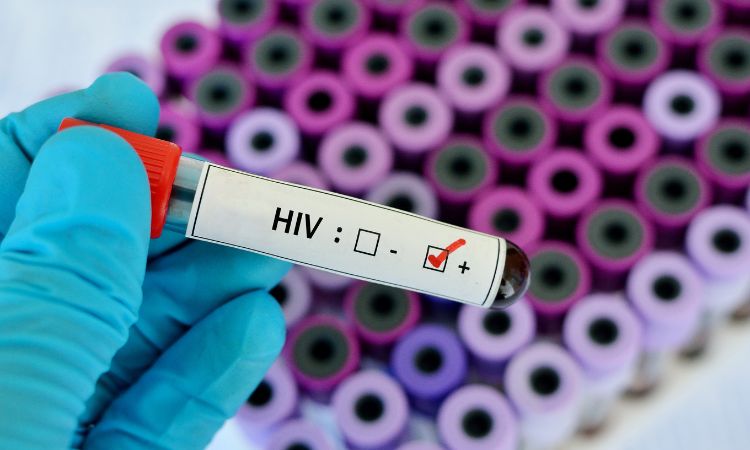Human immunodeficiency virus (HIV) is a virus that attacks immune system cells, making an individual more susceptible to various diseases and infections. It is spread through sharing injection equipment or through direct contact with the bodily fluids of an infected individual, most frequently during unprotected sex.
Statistics:
With 40.1 million deaths caused by HIV to date, it is still a major global public health concern. At the end of 2021, there were an estimated 38.4 million HIV-positive individuals worldwide, with 25.6 million of them living in the WHO African Region.
In 2021, about 1.5 million people contracted HIV, and almost 650 000 people died from HIV-related causes.
Symptoms:
Once an individual contracts HIV, the virus generally remains in the body for the rest of their lives. HIV symptoms, on the other hand, differ from those of other viral diseases in that the symptoms develop gradually. The infection has three stages if left untreated. Each stage has different symptoms and consequences.
Check Out Our Services
However, continuous antiretroviral therapy can reduce blood HIV levels to undetectable levels. This treatment won’t allow the virus to progress to the last stages of HIV infection neither it can be transmitted during sex.
Early stage:
The primary HIV infection stage ( Acute HIV infection or acute retroviral syndrome ) is the earliest noticeable stage. At this stage, people with HIV are very contagious and have high blood levels of the virus. The stage might be mistaken for flu or other viral infection since it exhibits flu-like symptoms.
The most frequent sign is a fever.
Other signs are:
- Headaches
- Sore throat
- Unusual fatigue
- Chills
- Muscle pain
- Swollen lymph nodes in the armpits, neck, or groin
- Discolored itchy rash with small bumps
- Mouth ulcers
- Oral thrush
Primary HIV symptoms may appear 2 to 4 weeks after initial contact, according to the Centers for Disease Control and Prevention (CDC). They may continue for a few weeks. Some people, however, could only show symptoms for a few days.
No Symptoms in Early Stages:
Once someone contracts HIV, ARS (acute retroviral syndrome) is fairly common. However, not everyone experiences symptoms immediately because according to HIV.gov, they can take up to ten years to appear.
Although the virus grows rapidly in the weeks after infection, early HIV symptoms usually only appear if the rate of cell death is high. This does not mean that asymptomatic HIV cases are any less severe or that asymptomatic individuals cannot spread the virus to others.
Latent Period:
HIV may advance to the clinically latent infection stage after initial exposure and possible primary infection. This is also known as an asymptomatic HIV infection because some persons do not experience any symptoms.
HIV latency can extend up to 10 or 15 years, according to HIV.gov. This indicates that the virus’s replication process has slowed considerably. However, this does not mean that HIV is no longer present or that it can no longer be spread to others.
Chronic HIV:
The acute infection may cause some people to still experience symptoms even though the majority are asymptomatic during this phase. Chronic HIV symptoms can range in severity from mild to severe.
The following episodes may occur in people, especially in advanced stages.
- coughing or breathing difficulties
- weight loss
- diarrhea
- fatigue
- high fever
AIDS:
The third and last stage of HIV infection, known as AIDS, may develop clinically as a latent infection. If an HIV patient is not getting or is not following treatment, such as antiretroviral therapy, the risk of progression is increased.
CD4 cells lower than 200 per cubic millimeter (mm3) of blood is an O -ve sign that HIV has advanced to its terminal stage. 500 to 1,600 cells/mm3 is the normal range.
Sometimes the only way to tell if someone has AIDS is to look at their general health. AIDS develops when HIV significantly impairs the immune system and can cause conditions that are specific to the disease, such as malignancies and infections that are uncommon in people who do not have HIV.
- Persistent high fevers of over 100°F (37.8°C)
- Diarrhea lasting longer than a week
- Severe chills and night sweats
- White spots in the mouth
- Genital or anal sores
- Unusually severe fatigue
- Brownish or discolored rashes
- Regular coughing and breathing problems
- Significant weight loss
- Persistent headaches
- Dementia and other neurological disorders
- Pneumonia
- Lymphoma
- Tuberculosis
How To Manage Symptoms?
As soon as HIV is diagnosed, therapy should begin. If you notice any new or deteriorating symptoms, speak with a doctor or other healthcare provider. Antiretroviral medications can be used to treat the infection. Even if there are no symptoms, they must be taken during the entire course of HIV.
By preventing the virus from reproducing, they reduce the amount of the virus inside the body to a level where it is no longer detectable. As a result, medications improve the quality of life, slow the progression of the condition, and reduce the risk of the virus spreading through sex.
To prevent the virus from developing resistance, you might get a combination of medications. Within six months, the majority of persons have undetectable virus levels. If this is not possible, using a medication known as preexposure prophylaxis will protect any sexual partners (PrEP). Additionally, condoms should be used to help stop sexual transmission.
Your doctor will continue to perform viral load tests to examine the amount of HIV in your blood as well as check the quantity of CD4 cells in your blood, which are important for fighting infections.
Other medical measures are usually required to manage AIDS-related illnesses or consequences, which can be fatal if HIV develops into AIDS. The CDC calculates that after an AIDS diagnosis, the average survival rate is 3 years without therapy.
Click Here For More Information about HIV


